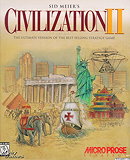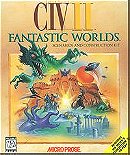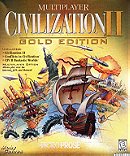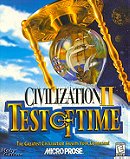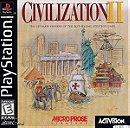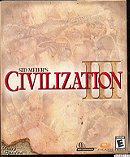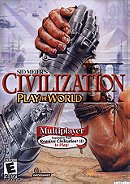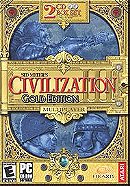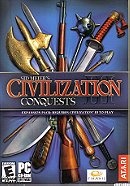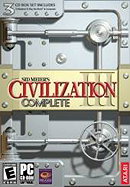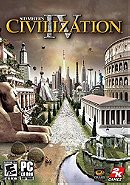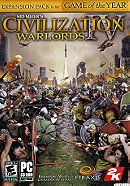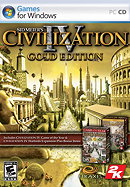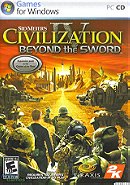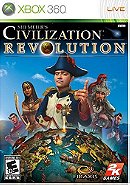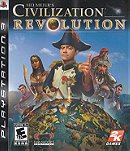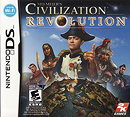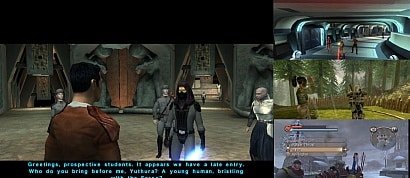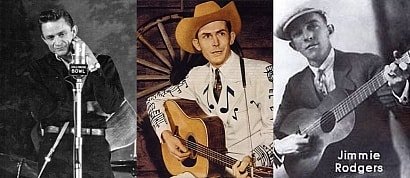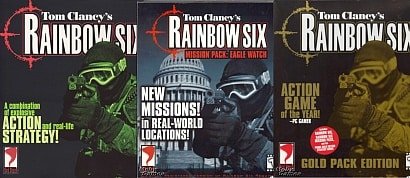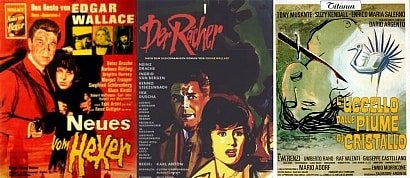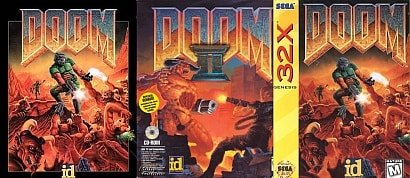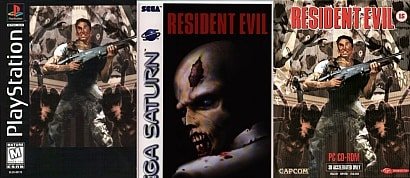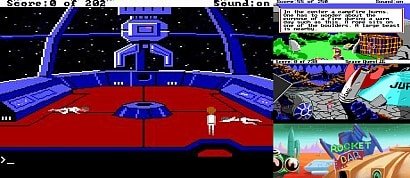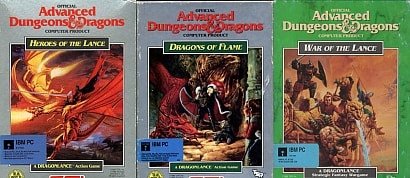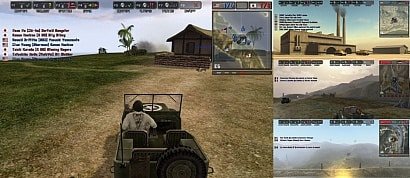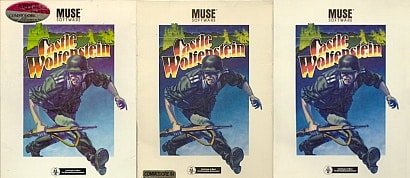Official Civilization series
Sort by:
Showing 29 items
Rating:
List Type:
Sid Meier's Civilization - PC Games
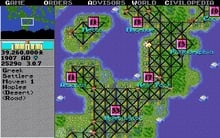 1999 - 'Build an Empire to stand the test of time' - what an appropriate tagline, both for 'Civilization' as well as its future legacy. No other game has given us so much replay value, thanks to it's ultra-addictive 'one-more-turn' gameplay, random map generator, and 15 separate game AI's all competing against your civilization. It's shocking to think that Microprose management didn't believe in this game and wanted Sid Meier to concentrate on flight simulators and other projects. Even at release, they put minimal marketing towards it, but Civ sold like proverbial 'hot cakes', largely thanks to game magazine reviews and word-of-mouth. The rest is history.
1999 - 'Build an Empire to stand the test of time' - what an appropriate tagline, both for 'Civilization' as well as its future legacy. No other game has given us so much replay value, thanks to it's ultra-addictive 'one-more-turn' gameplay, random map generator, and 15 separate game AI's all competing against your civilization. It's shocking to think that Microprose management didn't believe in this game and wanted Sid Meier to concentrate on flight simulators and other projects. Even at release, they put minimal marketing towards it, but Civ sold like proverbial 'hot cakes', largely thanks to game magazine reviews and word-of-mouth. The rest is history.
Sid Meier's CivNet - PC Games
1995 - CivNet was an attempt to add multi-player internet gaming to the game, yet therein lies two major flaws. If the the game is played in turn-based style, each player had to wait 10 minutes per player's turn. You get a dozen people playing, you're waiting 2hrs between turns! Choosing the 'simultaneous turn' mode speeds things up, but results in enemy units attacking you in the middle of a turn.
Sid Meier's Civilization II - PC Games
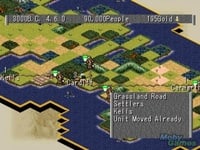 1996 - Listed in top 5 greatest games of all time on many sites, CivII took the winning formula from the original and improved every single aspect of it. The view changed from top-down to isometric, graphics were improved, units gained 'firepower' and 'hit points' to help stop spear guys from defeating battleships, AI was greatly improved, most windows became clickable and movable, and of course more units, more scenarios, more city improvements, more technologies, more world wonders, and an important feature - instead of defeating all enemies, player now had the option to win by being the first civ to build a spaceship and launch a mission to Alpha Centauri.
1996 - Listed in top 5 greatest games of all time on many sites, CivII took the winning formula from the original and improved every single aspect of it. The view changed from top-down to isometric, graphics were improved, units gained 'firepower' and 'hit points' to help stop spear guys from defeating battleships, AI was greatly improved, most windows became clickable and movable, and of course more units, more scenarios, more city improvements, more technologies, more world wonders, and an important feature - instead of defeating all enemies, player now had the option to win by being the first civ to build a spaceship and launch a mission to Alpha Centauri.
Prelude's rating:


Expansion for CivII that added 20 new scenarios to the game such as Alexander the Great, Age of Napoleon, American Civil War, and World War: 1979.
Civilization II: Fantastic Worlds - PC Games
1997: Fantastic Worlds expansion added 19 more scenarios to CivII as well as various editors for the game, helping fuel a strong mod community still active to this day.
Civilization II: Multiplayer Gold Edition - PC Games
1998: The 'Gold Edition' was a re-release of Civilization II, plus both expansion packs (Conflicts in Civilization & Fantastic Worlds), and also added two new ways to play - network play, and hot-seat multiplayer.
Sid Meier's Civilization IV: Colonization - PC Games
Sid Meier's Civilization IV: Colonization is the third offering in the award winning Civilization IV series. A re-imagining of the classic Colonization game Sid Meier created in 1994, Sid Meier's Civilization IV: Colonization is a total conversion of the Civilization IV engine into a game experience in which players will lead a European nation on their quest to colonize and thrive in the New World. Players will be challenged to guide their people from the oppressive motherland, discover a New World, negotiate, trade and fight as they acquire great power and battle for their freedom and independence.
Sid Meier's Civilization IV: Colonization does not require the original Civilization IV game to play.
Sid Meier's Civilization IV: Colonization does not require the original Civilization IV game to play.
Prelude's rating:


This is a list of all releases of the legendary Civilization series, including all expansions and special editions. I've also included civilization-inspired spin-offs such as the Call to Power series and Alpha Centauri.
----------------------------------------
An Interview With Sid Meier, creator of 'Civilization'
When did you first get the idea to create Civilization?
I think a couple of things led to the original idea for Civilization. The game I had done before Civilization was Railroad Tycoon. It was the first game that I had done that was more of what now falls into the "god game" genre -- less about flying an airplane, or a tank, or submarine, and more creative: you know, create something and take a map and make something of your own. So that was part of the inspiration.
That was a fun game to make and I was looking for an even more interesting topic to do a "god" type of game. I had played quite a bit of SimCity at the time. And again, it was a really good example of how it was fun to build something. I think the board game, Risk, that I played when I was a kid was a little bit of an inspiration there. You know, conquering the world.
So those things stirred together. There was actually a board game, a Civilization board game, but I hadn't really played that. It had a different approach. [My Civilization] was kind of like Risk brought to life on the computer. That was the original idea. And then when we added the technology and the whole sense of history to it. Putting all that together was the inspiration for Civilization.
A lot of the pieces fell together nicely. I think we were really impressed with Railroad Tycoon, how you could have a game that included an economic component -- actually building something, actually operating the trains, and some competition with other rail barons. We were ready to try a game that combined a lot of different pieces in an interesting way: the diplomacy, the economics, the military, and the building. Putting all that together was, I think, really where the fun of Civilization appeared. You were doing all these different things, and you felt you were this great leader.
Can you give a little window in to what your life was like at the time, in general?
MicroProse had been in business for eight or nine years at that time. And we had assembled a pretty good group of designers, programmers, and artists. That kind of represented the golden years of MicroProse, where we had some good games and we really felt we could tackle new topics and give new things a try. So it was a great creative time, I think, in the industry and also at MicroProse.
It's always fun to make computer games, but I think in those days we really hadn't come up with the idea of a genre yet, so we would say, "Let's do a game about pirates!" "OK! There will be sword fighting and there will be ships!" or "Let's do a game about civilization." "Yeah! We'll have economics and diplomacy. There will be military..." We didn't say, "What category are we going to fit this into?" There was a lot more experimenting. The graphics and the sound technology were limited, so the investment wasn't so high to make a game.
You could only make it look so good, or sound so good. So we didn't have to spend the millions and millions and millions of dollars like we do today. It was a little less risky, so we could take a chance with games because they didn't cost as much money. We just started with the topic, as opposed to the genre. We said, "Pirates!," or "Railroads!," or "Civilization," or "Civil War," or whatever. It was like, "It's a neat idea. Now what do we do to make it fun?" That's basically what we started with.
What computer platform was the first Civilization originally designed for?
It was created on the IBM PC. I remember discovering -- this is esoteric -- but I remember discovering a way to do overlays. At the time, a PC was limited to 640K of memory. I found this way to do overlays where we could bring in extra code from the disk to replace code that was already there.
So we could do all these reports like that by just bringing stuff in that you didn't need all the time. It opened up new possibilities -- allowed us to make the game, add more code to it, and do more stuff with it. And we were also transitioning from 16‑color EGA graphics to 256‑color VGA graphics, which were awesome! [Civilization] actually supported both EGA and VGA. That's really where the 16-civilization limitation came from, because we only had 16 colors from EGA. [laughs] It was definitely an IBM PC product to start with.
How much of the coding did you do on Civilization personally?
I did just about all the coding. I had some help with some tools and things like that. But I'd have to say that I did most of the coding in that game. And some of the art. I'm not sure how many of them survived until the end. I think some of the original units were more mine, at least in the EGA version.
When you were creating Civilization, how much research did you put into world history?
Not a whole lot. I did do a little bit of reading, and it's kind of where the idea of the city as one of the kind of core elements of the game came from. It just struck immediately: "4000 BC the first city was formed," and I thought, "Oh, that's a cool place to start the game." But basically, I tried to use fairly well‑known concepts, well‑known leaders, and well‑known technologies. I mean, it wasn't intended to be "bizarre facts about history." It's more like, "Here, we all know a little bit about history, but now you get to take control of it, invent gunpowder, and the wheel, electricity, all sorts of cool stuff." But you don't have to research to know what it is, you just know.
Was an educational aspect to Civilization ever your intention at all?
No, not really, we distinguished between education and learning. The intent was never really to educate people, but we do think that part of the fun of playing a game is some element of learning. Even if you are playing a first person shooter, you learn where the good places to hide or what weapons are good. Part of the fun is learning something; feeling that "I'm better at this game than I was yesterday, and if I play a little more I'm going to get even better."
With Civilization, the things that you're learning about are history, different technologies, how government works, the importance of exploration, and things that are historical. We really think that learning adds to the fun of a game. Civilization provides enough interesting decisions that you have to think about; you try things out, and I think that makes the game more fun.
I've read some criticism of Civilization that accuses the game of being Western-centric, or American biased. What do you think about that?
I think that's probably true. In those days, there was a little bit of a Cold War mentality about the game. The world was divided between the West and the Communist worlds, and we were trying to present the most familiar leaders, the most familiar technologies, and the most familiar ideas. And the game-playing world was much more an American world in those days; today it's much more of a global audience. PC games were played mostly in Western countries. So I think Civilization had somewhat of a Western-centric view of the world. Just the whole idea that technology drives progress might not be so much of an Eastern concept as it is a Western one, so I think it's true.
Have you tried to address some of those concerns with newer versions of Civilization, like with Civilization III?
We have. There have been a couple directions we've gone with the later versions of Civilization. One of the criticisms was that the game was too militaristic, that it was basically a military game. We tried to create different victory conditions, but the military aspect of the game was in many ways the most interesting and the most fun to play. So it often become a military game, which, I think, is not necessarily a bad thing.
But in later Civilizations, we tried to flesh out, and make more interesting, some of the other victory paths. We tried to include more female leaders in later games. We tried to include more third world, Eastern, or less familiar leaders in other games, and to include more civilizations from around the world. We did include a bigger variety of civilizations and peoples as we expanded it.
Civilization is known for its addictiveness: it's commonly called the "one more turn" phenomenon, as I'm sure you know. Do you know where the phrase "one more turn" originated?
I don't specifically remember when I first heard that term, or where it came from. Civilization did have that special quality of giving you something to look forward to. There's always one or two things you're looking forward to, like when that building is done, or when I get that new unit, or finish that technology. So there was never really a good place to stop playing.
[laughs] I've often found myself playing and then realized I'm late for a meeting, or forgot this or that. So yeah, I've been exposed to the phenomenon myself.
Did you have any direct involvement with Civilization II? Did you like how that game turned out?
Civilization II was primarily Brian Reynolds' design. We talked about ideas, and I played it, but that was mostly his design. Yes, I think it turned out very well. It fixed a few things that were not working right in Civilization I, and it really expanded the game. We were a little hesitant to make the original too big, and I think Civilization II said, "OK. You know how to play Civilization. Now let's give you more units, more technologies, and more stuff to do." So, it was a natural evolution from the first game. I think if we'd brought it out first, it would've been too much; but once people got used to playing it, Civilization II was the right game at the right time.
Civilization III improved upon Civilization II with more units and new ways to win. And Civilization IV seems to have expanded on that even more. Do you think you can keep improving Civilization sequels without making them unplayably complicated?
That's something that we are aware of. With Civilization IV, we tried to take something out with every new thing we put in. We felt we where bumping up against the limit of complexity for Civilization game players. We have new ideas, but we take the general approach that for every new thing we put in, or more complicated thing we put in, we either simplify or take out something that was in there before. It's a very rich topic; we could put so much stuff in there that we could overwhelm the player. We are sensitive to that.
Do you ever feel that the success of Civilization has overshadowed your other games?
Well, no. Frankly, Civilization has, in many ways, allowed me to do my other games. So I have no complaints at all about Civilization. I think that if somebody likes Civilization, they may be more likely to consider Pirates, or another kind of game that I've done. And if Civilization is the best known game I make, then I'm perfectly happy. It's a game that I'm really proud of.
Each version of Civilization, from one through four, seems like it has its own distinct character and charm. The sequels add new features but don't obsolete the earlier games. They're all still playable. So the question is: which version of Civilization is your favorite: I, II, III, or IV?
[laughs] Well, they all have something special. Civilization I is my sentimental favorite, because that was the first one. And we were really charting brand new territory. I think Civilization IV is a great version. There's a lot of cool new stuff, a great interface, and multi-player support -- the best it's ever been. And there are some new ideas with religion and things like that. So I'd have to say Civilization I and Civilization IV are my top favorites.
Could you sum up why you think Civilization has been continuously popular for the last sixteen years?
Well, I think Civilization is based upon some good, sound, fundamental game design principles: giving the player some very interesting things to do and immersing them in a world that is kind of familiar, but also has lots of possibilities. And even though the technology has evolved tremendously over the last 15 years, those kinds of core game play elements, I think, stand the test of time.
----------------------------------------
An Interview With Sid Meier, creator of 'Civilization'
When did you first get the idea to create Civilization?
I think a couple of things led to the original idea for Civilization. The game I had done before Civilization was Railroad Tycoon. It was the first game that I had done that was more of what now falls into the "god game" genre -- less about flying an airplane, or a tank, or submarine, and more creative: you know, create something and take a map and make something of your own. So that was part of the inspiration.
That was a fun game to make and I was looking for an even more interesting topic to do a "god" type of game. I had played quite a bit of SimCity at the time. And again, it was a really good example of how it was fun to build something. I think the board game, Risk, that I played when I was a kid was a little bit of an inspiration there. You know, conquering the world.
So those things stirred together. There was actually a board game, a Civilization board game, but I hadn't really played that. It had a different approach. [My Civilization] was kind of like Risk brought to life on the computer. That was the original idea. And then when we added the technology and the whole sense of history to it. Putting all that together was the inspiration for Civilization.
A lot of the pieces fell together nicely. I think we were really impressed with Railroad Tycoon, how you could have a game that included an economic component -- actually building something, actually operating the trains, and some competition with other rail barons. We were ready to try a game that combined a lot of different pieces in an interesting way: the diplomacy, the economics, the military, and the building. Putting all that together was, I think, really where the fun of Civilization appeared. You were doing all these different things, and you felt you were this great leader.
Can you give a little window in to what your life was like at the time, in general?
MicroProse had been in business for eight or nine years at that time. And we had assembled a pretty good group of designers, programmers, and artists. That kind of represented the golden years of MicroProse, where we had some good games and we really felt we could tackle new topics and give new things a try. So it was a great creative time, I think, in the industry and also at MicroProse.
It's always fun to make computer games, but I think in those days we really hadn't come up with the idea of a genre yet, so we would say, "Let's do a game about pirates!" "OK! There will be sword fighting and there will be ships!" or "Let's do a game about civilization." "Yeah! We'll have economics and diplomacy. There will be military..." We didn't say, "What category are we going to fit this into?" There was a lot more experimenting. The graphics and the sound technology were limited, so the investment wasn't so high to make a game.
You could only make it look so good, or sound so good. So we didn't have to spend the millions and millions and millions of dollars like we do today. It was a little less risky, so we could take a chance with games because they didn't cost as much money. We just started with the topic, as opposed to the genre. We said, "Pirates!," or "Railroads!," or "Civilization," or "Civil War," or whatever. It was like, "It's a neat idea. Now what do we do to make it fun?" That's basically what we started with.
What computer platform was the first Civilization originally designed for?
It was created on the IBM PC. I remember discovering -- this is esoteric -- but I remember discovering a way to do overlays. At the time, a PC was limited to 640K of memory. I found this way to do overlays where we could bring in extra code from the disk to replace code that was already there.
So we could do all these reports like that by just bringing stuff in that you didn't need all the time. It opened up new possibilities -- allowed us to make the game, add more code to it, and do more stuff with it. And we were also transitioning from 16‑color EGA graphics to 256‑color VGA graphics, which were awesome! [Civilization] actually supported both EGA and VGA. That's really where the 16-civilization limitation came from, because we only had 16 colors from EGA. [laughs] It was definitely an IBM PC product to start with.
How much of the coding did you do on Civilization personally?
I did just about all the coding. I had some help with some tools and things like that. But I'd have to say that I did most of the coding in that game. And some of the art. I'm not sure how many of them survived until the end. I think some of the original units were more mine, at least in the EGA version.
When you were creating Civilization, how much research did you put into world history?
Not a whole lot. I did do a little bit of reading, and it's kind of where the idea of the city as one of the kind of core elements of the game came from. It just struck immediately: "4000 BC the first city was formed," and I thought, "Oh, that's a cool place to start the game." But basically, I tried to use fairly well‑known concepts, well‑known leaders, and well‑known technologies. I mean, it wasn't intended to be "bizarre facts about history." It's more like, "Here, we all know a little bit about history, but now you get to take control of it, invent gunpowder, and the wheel, electricity, all sorts of cool stuff." But you don't have to research to know what it is, you just know.
Was an educational aspect to Civilization ever your intention at all?
No, not really, we distinguished between education and learning. The intent was never really to educate people, but we do think that part of the fun of playing a game is some element of learning. Even if you are playing a first person shooter, you learn where the good places to hide or what weapons are good. Part of the fun is learning something; feeling that "I'm better at this game than I was yesterday, and if I play a little more I'm going to get even better."
With Civilization, the things that you're learning about are history, different technologies, how government works, the importance of exploration, and things that are historical. We really think that learning adds to the fun of a game. Civilization provides enough interesting decisions that you have to think about; you try things out, and I think that makes the game more fun.
I've read some criticism of Civilization that accuses the game of being Western-centric, or American biased. What do you think about that?
I think that's probably true. In those days, there was a little bit of a Cold War mentality about the game. The world was divided between the West and the Communist worlds, and we were trying to present the most familiar leaders, the most familiar technologies, and the most familiar ideas. And the game-playing world was much more an American world in those days; today it's much more of a global audience. PC games were played mostly in Western countries. So I think Civilization had somewhat of a Western-centric view of the world. Just the whole idea that technology drives progress might not be so much of an Eastern concept as it is a Western one, so I think it's true.
Have you tried to address some of those concerns with newer versions of Civilization, like with Civilization III?
We have. There have been a couple directions we've gone with the later versions of Civilization. One of the criticisms was that the game was too militaristic, that it was basically a military game. We tried to create different victory conditions, but the military aspect of the game was in many ways the most interesting and the most fun to play. So it often become a military game, which, I think, is not necessarily a bad thing.
But in later Civilizations, we tried to flesh out, and make more interesting, some of the other victory paths. We tried to include more female leaders in later games. We tried to include more third world, Eastern, or less familiar leaders in other games, and to include more civilizations from around the world. We did include a bigger variety of civilizations and peoples as we expanded it.
Civilization is known for its addictiveness: it's commonly called the "one more turn" phenomenon, as I'm sure you know. Do you know where the phrase "one more turn" originated?
I don't specifically remember when I first heard that term, or where it came from. Civilization did have that special quality of giving you something to look forward to. There's always one or two things you're looking forward to, like when that building is done, or when I get that new unit, or finish that technology. So there was never really a good place to stop playing.
[laughs] I've often found myself playing and then realized I'm late for a meeting, or forgot this or that. So yeah, I've been exposed to the phenomenon myself.
Did you have any direct involvement with Civilization II? Did you like how that game turned out?
Civilization II was primarily Brian Reynolds' design. We talked about ideas, and I played it, but that was mostly his design. Yes, I think it turned out very well. It fixed a few things that were not working right in Civilization I, and it really expanded the game. We were a little hesitant to make the original too big, and I think Civilization II said, "OK. You know how to play Civilization. Now let's give you more units, more technologies, and more stuff to do." So, it was a natural evolution from the first game. I think if we'd brought it out first, it would've been too much; but once people got used to playing it, Civilization II was the right game at the right time.
Civilization III improved upon Civilization II with more units and new ways to win. And Civilization IV seems to have expanded on that even more. Do you think you can keep improving Civilization sequels without making them unplayably complicated?
That's something that we are aware of. With Civilization IV, we tried to take something out with every new thing we put in. We felt we where bumping up against the limit of complexity for Civilization game players. We have new ideas, but we take the general approach that for every new thing we put in, or more complicated thing we put in, we either simplify or take out something that was in there before. It's a very rich topic; we could put so much stuff in there that we could overwhelm the player. We are sensitive to that.
Do you ever feel that the success of Civilization has overshadowed your other games?
Well, no. Frankly, Civilization has, in many ways, allowed me to do my other games. So I have no complaints at all about Civilization. I think that if somebody likes Civilization, they may be more likely to consider Pirates, or another kind of game that I've done. And if Civilization is the best known game I make, then I'm perfectly happy. It's a game that I'm really proud of.
Each version of Civilization, from one through four, seems like it has its own distinct character and charm. The sequels add new features but don't obsolete the earlier games. They're all still playable. So the question is: which version of Civilization is your favorite: I, II, III, or IV?
[laughs] Well, they all have something special. Civilization I is my sentimental favorite, because that was the first one. And we were really charting brand new territory. I think Civilization IV is a great version. There's a lot of cool new stuff, a great interface, and multi-player support -- the best it's ever been. And there are some new ideas with religion and things like that. So I'd have to say Civilization I and Civilization IV are my top favorites.
Could you sum up why you think Civilization has been continuously popular for the last sixteen years?
Well, I think Civilization is based upon some good, sound, fundamental game design principles: giving the player some very interesting things to do and immersing them in a world that is kind of familiar, but also has lots of possibilities. And even though the technology has evolved tremendously over the last 15 years, those kinds of core game play elements, I think, stand the test of time.
Added to
28 votes
Game Series of Interest
(199 lists)list by Zozoulini
Published 12 years, 5 months ago  21 comments
21 comments
 21 comments
21 commentsPeople who voted for this also voted for
RPG World: Xbox Edition
country music
Silent Hill series
Rammstein Discography
Official Rainbow Six series
Film Title = Song Title
Favorite postmodern books
ICONIC IMAGES OF MUSIC LEGENDS — THE BLUES
Krimi Films
Ron Burgundy's Amazing Cameos (SPOILERS)
Favorite TV Show Characters
Weapons of Choice
Don't Mess With Texas - Rock Stars From Texas
Top 20 All-Time Favorite Bands
Remembering Bill Paxton: A Tribute to Awesomeness
More lists from Prelude
DOOM Series
Resident Evil series
[Series] Space Quest
Dungeons & Dragons - Classics
[Series] Battlefield
Fly the Friendly Skies: History of Flight Sims
Wolfenstein series
 Login
Login

 81
81
 8.9
8.9
 0
0


